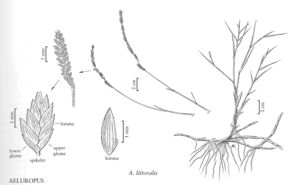Difference between revisions of "Aeluropus littoralis"
FNA>Volume Importer |
GeoffLevin (talk | contribs) m (Corrected "Pari." to "Parl." in authority) |
||
| (5 intermediate revisions by 2 users not shown) | |||
| Line 1: | Line 1: | ||
{{Treatment/ID | {{Treatment/ID | ||
|accepted_name=Aeluropus littoralis | |accepted_name=Aeluropus littoralis | ||
| − | |accepted_authority=(Gouan) | + | |accepted_authority=(Gouan) Parl. |
|publications= | |publications= | ||
|basionyms= | |basionyms= | ||
| Line 16: | Line 16: | ||
-->{{Treatment/Body | -->{{Treatment/Body | ||
|distribution=Ariz. | |distribution=Ariz. | ||
| − | |discussion=<p>Aeluropus littoralis is native to Eurasia, where it grows in sandy, often saline habitats. It has been cultivated experimentally in Pima County, Arizona; it is not established in the Flora region.</p> | + | |discussion=<p><i>Aeluropus littoralis</i> is native to Eurasia, where it grows in sandy, often saline habitats. It has been cultivated experimentally in Pima County, Arizona; it is not established in the Flora region.</p> |
|tables= | |tables= | ||
|references= | |references= | ||
| Line 25: | Line 25: | ||
-->{{#Taxon: | -->{{#Taxon: | ||
name=Aeluropus littoralis | name=Aeluropus littoralis | ||
| − | + | |authority=(Gouan) Parl. | |
| − | |authority=(Gouan) | ||
|rank=species | |rank=species | ||
|parent rank=genus | |parent rank=genus | ||
| Line 32: | Line 31: | ||
|basionyms= | |basionyms= | ||
|family=Poaceae | |family=Poaceae | ||
| − | |illustrator=Linda A. Vorobik | + | |illustrator=Linda A. Vorobik;Annaliese Miller |
| + | |illustration copyright=Utah State University | ||
|distribution=Ariz. | |distribution=Ariz. | ||
|reference=None | |reference=None | ||
| Line 38: | Line 38: | ||
|publication year= | |publication year= | ||
|special status= | |special status= | ||
| − | |source xml=https:// | + | |source xml=https://bitbucket.org/aafc-mbb/fna-data-curation/src/200273ad09963decb8fc72550212de541d86569d/coarse_grained_fna_xml/V25/V25_37.xml |
|subfamily=Poaceae subfam. Chloridoideae | |subfamily=Poaceae subfam. Chloridoideae | ||
|tribe=Poaceae tribe Cynodonteae | |tribe=Poaceae tribe Cynodonteae | ||
Latest revision as of 15:10, 1 December 2021
Plants both rhizomatous and stoloniferous. Culms 9-25 cm, erect or decumbent. Sheaths strongly ridged, glabrous; blades 1.5-7 cm, adaxial surfaces glabrous, scabridulous, or sparsely hairy, strongly and closely ridged. Panicles 1-7 cm long, 4-10 mm wide, with 4-13 branches, each bearing 12 or more spikelets; lower branches usually not overlapping. Spikelets 3-4.5 mm, ovoid, with 6-9 florets. Glumes unequal, veins scabrous, margins glabrous or hairy; lower glumes 1-2.5 mm, 1-4-veined; upper glumes 1.5-3 mm, 3-6-veined; lemmas 1.5-4 mm, 9-11-veined, veins scabrous, margins glabrous or hairy, apices mucronate, mucros 0.1-0.3 mm; paleas hyaline, keels ciliolate; anthers 1-1.5 mm. Caryopses strongly compressed. 2n = 20.
Discussion
Aeluropus littoralis is native to Eurasia, where it grows in sandy, often saline habitats. It has been cultivated experimentally in Pima County, Arizona; it is not established in the Flora region.
Selected References
None.
